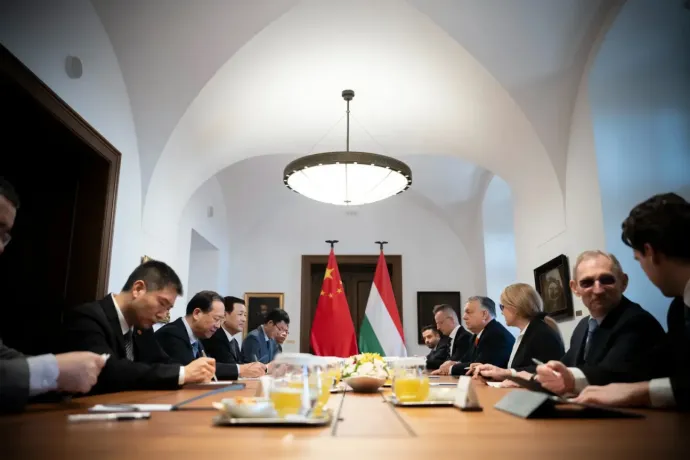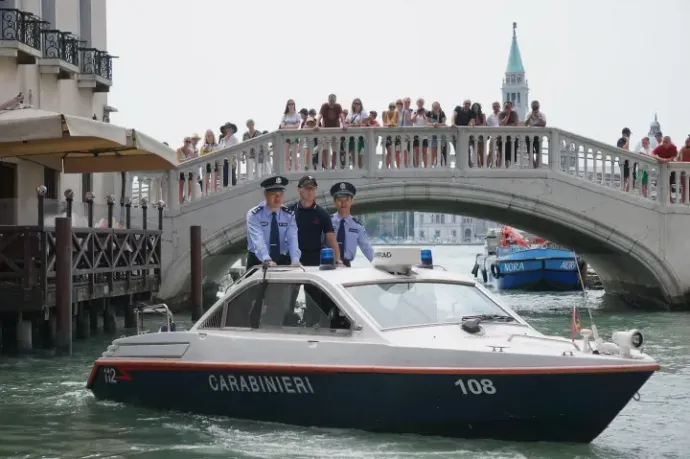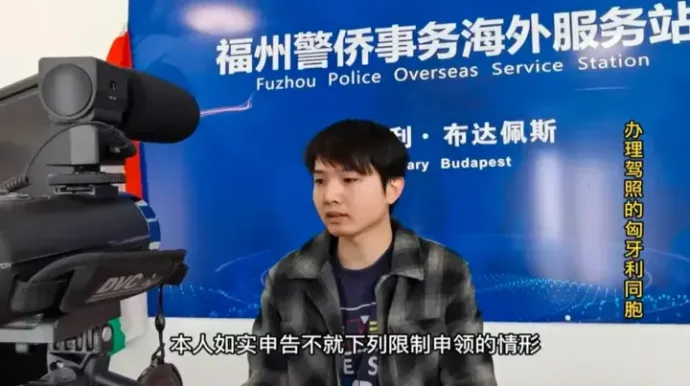What do we know about the Chinese police officers who may soon be patrolling in Hungary?
April 25. 2024. – 02:53 PM

Much controversy has surrounded the Hungarian-Chinese agreement allowing Chinese police officers to patrol in Hungary alongside their Hungarian counterparts. Those familiar with police work have said that there may be practical benefits to such a cooperation, for which there are several international examples, but there are also indications suggesting that it could be Beijing's way of increasing Chinese influence and direct control over Chinese communities in Hungary.
According to Gergely Gulyás, Minister of the Prime Minister's Office, Chinese police officers will essentially act as interpreters for the Hungarian police, while Katalin Cseh, Momentum MEP, suggests that their presence in Hungary will in fact be a means of foreign interference in EU affairs.
The Ministry of Interior has claimed that this is an existing, transparent cooperation which is already present in many other countries, while the National Police Headquarters (ORFK) said that the whole thing has still only gotten as far as an agreement in principle between Interior Minister Sándor Pintér and his Chinese counterpart. This was certainly a prelude to Prime Minister Viktor Orbán receiving the Chinese Minister for Public Security in February.
EU institutions are concerned as well
The presence of Chinese police within the European Union has also become a topic of discussion among the EU institutions. The European Commission expressed its concern about China's police expansion in mid-April, although this was not in relation to the inter-state agreements allowing patrols, but had to do with the covert presence of Chinese police stations. Speaking at the European Parliament, EU Commissioner Promoting our European Way of Life, Margaritis Skinas, said that it was with concern that they were following reports from several Member States about the appearance of Chinese police stations.
This was also when Katalin Cseh mentioned that Chinese police officers might soon be patrolling at Hungarian tourist sites and said that "if this is not foreign interference in EU affairs, then I don't know what is". She was the only one to specifically mention the issue of patrolling, while others have either spoken in general terms about police cooperation or about the alleged police stations.
Even Anna Bonfrisco, the main speaker of Identity and Democracy, which includes representatives of Marine Le Pen's National Rally and Matteo Salvini's League, called the facilities a major threat, demanding sanctions against those involved. Reinhard Bütikofer of the Greens, for example, would like to ensure that several countries, including Hungary, loosen police cooperation with China. Mathieu Michel, representing the Belgian presidency of the Council, recalled that action against hybrid threats had been unanimously agreed by the heads of state and government.
National Police Headquarters: The rights of the Hungarian police will not be diminished
But what could the agreement, according to which Chinese police officers may patrol Hungary alongside Hungarian police officers, really mean?
At the government briefing on 11 April, Gergely Gulyás said that the agreement in no way violates Hungary's sovereignty because it does not allow Chinese police officers to carry weapons and take independent action in Hungary. According to Gulyás, they will basically act as interpreters, and since it is better if this is done by a professional who is familiar with the special terminology, replacing them with civilian interpreters would not be adequate. Their presence is also justified by the size of the Chinese community in Budapest and the increasing number of tourists coming from China, the minister argued.
"If there will be Chinese police officers arriving in our country within the framework of this cooperation, they will carry out their duties wearing only uniforms, without weapons or coercive devices.
– ORFK (The National Police HQ) replied to Telex. They will not be permitted to investigate, and will not be authorized to act on their own initiative either. Their presence may be justified by the increase in tourism in the capital and in other bigger cities frequented by tourists, but the involvement of police officers from the Far East may also be beneficial due to the periodic increase in the number of Chinese citizens coming from China on account of major business investments. In summary, it may be concluded that the rights and responsibilities of the Hungarian police will not be diminished by the international cooperation. The persons concerned, whether residents or foreigners, are in all circumstances clients of the Hungarian authorities acting under Hungarian law. This rule is binding in respect to both procedural and substantive law."
There are sevearal examples of similar international cooperation, even relating to specific events. At Budapest's huge Sziget Festival organized each summer ”English, Dutch, German and French police officers have assisted Hungarian police officers in previous years, and foreign police officers – Croatian, Slovakian, Romanian, Austrian and Polish – have also been regularly present at the Hungarian Formula 1 Grand Prix for more than 10 years," the ORFK wrote.
There are also Romanian and Slovakian patrol officers on the roads, and uniformed Turkish officers at busy border crossings." The statement said that so far no complaints had been received about their involvement.
Likewise, Hungarian police officers have also appeared at places visited by Hungarian tourists abroad: "We have been sending Hungarian patrols to the Croatian coast during the summer season for many years." It was also important to point out that pilgrims to the annual Csíksomlyó pilgrimage in Romania have also had the opportunity to see Hungarian police officers.
According to them, the current agreement with China simply makes this same cooperation possible.
"This is a purely law enforcement issue, there is no way anyone could gain access to sensitive data of national security importance."
– said a police source who, based on his own professional experience as an investigator, has seen firsthand how useful such international cooperation can be when foreigners have supported the work of the police in Hungary.
In Serbia, the installation of CCTV was also part of the cooperation
China has a similar agreement with Serbia, under which nine Chinese police officers arrived in the country last September, where they conducted patrols in Belgrade, Novi Sad and Smederevo along with 20 Serbian police officers until the end of October – focusing on Chinese tourists there, according to Chinese and Serbian officials.
Serbian Interior Ministry spokesman Željko Brkić said that the joint patrols were another step in strengthening relations between the two countries, indicating that Serbia is a reliable partner for China. The question is how far the relationship between the two countries can be strengthened along these lines, as well as what kind of model can be followed by countries that have signed similar agreements.

China's relationship with Serbia was already a close one before the patrols began: the installation of Chinese Huawei surveillance cameras with facial recognition capabilities in Belgrade started in 2019 – as 444.hu reported in detail. Although the facial recognition feature is officially not being used, but already in the first year it was reported that the authorities used it to impose fines on participants in a protest reinforced with roadblocks.
Other Serbian cities have installed surveillance systems of the Chinese company Dahua, which has been on the US sanctions list since 2019. The US suspects that Dahua developed the software that the Chinese government is using to monitor the Uyghur minority in the Xinjiang Uyghur Autonomous Region. Many members of the minority have been sent to re-education camps if they were deemed not loyal enough to the state led by the Chinese Communist Party.
Professional help or a Chinese Trojan horse?
One of the European forerunners of joint patrols with the Chinese officers was Italy. An agreement was signed back in 2015, which led to the regular arrival of Chinese police officers up until 2019. This was halted by the pandemic, and in 2022 the Italian government said it no longer intended to continue the practice. It is telling that the Chinese side used the Italian agreement as an example when concluding the deal with Serbia, even though it had not been valid for at least a year.
Rome did not withdraw from the agreement because of concerns about patrolling aimed at overcoming linguistic difficulties, but because it was discovered that unofficial Chinese police stations may also have appeared in Italy. The phenomenon has been highlighted by the Spanish-based rights group Safeguard Defenders, which has found more than a hundred similar facilities across Europe. They have been reported from the Czech Republic, France, Spain, Canada, the United States, the United Kingdom and Nigeria.
According to Beijing, these are not police stations at all, but merely volunteer centres run by locals to assist the Chinese living there with administrative matters. However, according to Safeguard Defender, this is in fact China's way of keeping the Chinese colonies under direct control, and through the police stations they can even force their citizens back home – for example, by putting pressure on a relative back home – without the authorities and rights protection organizations of the country concerned being aware of this.
The 'Chinese police stations' are feared to be illegal agencies acting as ideology police, an extension of the communist state, with their existence also having been reported in Portugal and Germany, Euronews reported back in 2022.
Investigations were previously launched in the US, Canada, the Netherlands and Germany as well. Speaking in the European Parliament, Margaritis Skinas also said that these unofficial Chinese locations are used to facilitate actions by the Chinese state outside its own territory that could be in serious violation of human rights and the rule of law.
There used to be a place that very much seemed to be a Chinese police station in Budapest
There are indications that there used to be a similar unofficial Chinese police station in Budapest, which according to Chinese reports was an overseas police service centre of Qingtian County, operating in Józsefváros since 2018. Its purpose was to help people from the Qingtian region living in Hungary with various paperwork, such as renewing driving licences and identity cards.
A 2019 Chinese entry actually acknowledged that the service centre in Budapest is run by the Qingtian County Public Security Bureau, which "provides services to the Chinese living overseas by setting up Chinese domestic police contact centres and overseas service centres on the ground and remotely settles conflicts involving the Chinese living overseas". So some kind of police link has already been mentioned by the Chinese side here – which weakens Beijing's argument that this is maintained solely by the voluntary work of members of the Chinese community in the country.
Safeguard Defenders reported that a similar centre was operating in Budapest's Kőbánya, in addition to the one in Józsefváros, and that it was connected to Fujian, the largest city in Fuzhou province. It is certain that the building in Józsefváros also had a Chinese inscription attesting to this, with the sign disappearing after Momentum's Márton Tompos posted a photo of it.
There also used to be a publicly accessible YouTube video about the existence of this overseas service centre of the Fuzhou police in Budapest: in the video, people were doing administrative things in front of a blue sign, under Chinese and English inscriptions, and sometimes they called out to the camera. But this too disappeared after the existence of the centre became more widely known. By now only a saved image from the video remains as trace:

No investigation has been launched in Hungary against the Chinese service centres, because – as the Ministry of the Interior previously argued – there are no Chinese police stations in the country.
For more quick, accurate and impartial news from and about Hungary delivered straight into your inbox, subscribe to the Telex English newsletter!